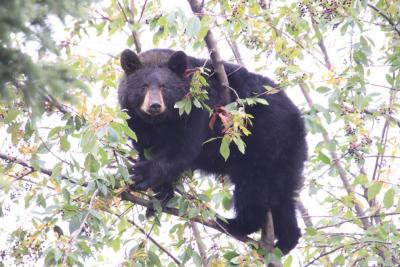Will Bears Find A Good Winter Den At Your Place?
What Makes A Good Bear Den?
A bear den needs to big enough to curl up in and small enough to keep the bear warm and cozy through the winter. Bear dens are generally well-hidden; pregnant moms work extra-hard to make sure they choose a den site that will keep their helpless newborn cubs snug, dry and safe from predators.
Bears make their dens in hollow trees or logs, under the root mass of a tree, in rock crevices, high up in a tree or even in a brush pile or ground “nest” in warmer climates.
Sometimes bears industriously excavate their own dens; often they simply take advantage of whatever natural or man-made spaces are available and fit their needs. Bear dens are often lined with grasses, leaves or needles and usually have small, camouflaged openings.
Some People-Places Make Great Bear Dens
It’s not unusual for a bear to den up and even give birth under decks, in crawl spaces, or under bushes and brush piles. Old tires, piles of building materials and other debris can offer attractive possibilities. Bears may make themselves at home in vacant buildings, even when they are really garages, storage sheds or vacation homes that are only vacant over the winter.
An adult bear can easily fit through an average pet door. And even empty coolers hold odors and can attract bears. Store coolers out of sight.
To a bear, these areas can seem like the perfect winter home. They’re dark, snug and often come with at least one built-in wall. Bears don’t have collarbones, so even adult bears can fit through what seems like an impossibly small opening. Like your average dog door. The general guideline is that if a bear can get its head inside, the rest of the bear can follow. Many homes in bear country offer bears lots of possibilities. So, if you’d rather not have bears as houseguests, read on.
How To Keep Bears From Denning At Your Place
Walk around your home and property and think like a bear. Where would you den up for the winter?
Porches, decks and crawl spaces. Block crawl spaces and other small areas that might attract a bear. If the area under your porch or deck is open or just has decorative lattice consider installing sturdy wire fencing or wood, brick or stone barriers. As a bonus, you’ll also keep out other critters looking for winter homes, including raccoons and skunks.
Outbuildings. Check garages, storage sheds and outbuildings. Now is a good time to remove or safely store anything that might attract a bear, including bird seed, pet food and livestock feed. Take time to make sure antifreeze is stored somewhere secure; antifreeze smells sweet, but it’s highly poisonous to people, pets and wildlife, including bears.
Vacation Homes. Lock all ground floor and bear-accessible windows and doors. Bear-accessible means any windows or sliding glass doors that bears could reach by climbing up a convenient tree, staircase or support post that leads to a second-floor deck. Consider installing an electric fence for extra protection.
An RV parked outside for the winter can smell like a giant can full of food to a hungry bear. Remove all food, thoroughly clean, and consider protecting with an electric fence or unwelcome mat.
Campers and RVS can make attractive winter homes for bears; if you’ve left windows or doors open even a crack to air them out, bears can easily let themselves in. Thoroughly clean, paying special attention to vents. Remove all food and anything with an odor and avoid using fruit or vanilla-scented air fresheners. Bears don’t know they’re not good to eat. If your RV or camper is parked outside for the winter, consider protecting it with an electric fence, or unwelcome mats.
To make sure there’s nothing around your home that would attract hungry bears, check out our article on “What’s on the Menu at Your Place?” And please pass this article along to your friends and neighbors.
Thanks for being BearWise this fall. Taking precautions now will help you prevent problems around your home and help keep bears wild.
BearWise®. Created by bear biologists. Supported by State Wildlife Agencies.
Dedicated to helping people live responsibly with black bears.
Copyright © 2018-2021 BearWise | All Rights Reserved. To reprint, redistribute or excerpt without changing or altering content in any way, please credit: Courtesy of BearWise® | www.BearWise.org


